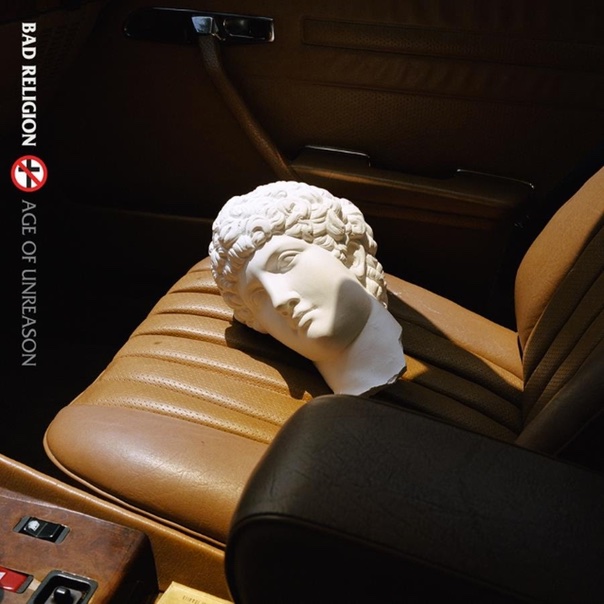ALBUM REVIEW: Bad Religion’s ‘Age of Unreason’ fights ignorance with hooky skate punk

Bad Religion, “Age of Unreason.”
By all accounts, L.A.’s Bad Religion was ground zero for the Tony Hawk disciples with a taste for harmonized vocals over D-beat and power chords. The band’s 1982 debut, How Could Hell Be Any Worse?, became the blueprint for ‘90s skate punk, and subsequent releases like 1988’s Suffer and 1994’s Stranger Than Fiction remain genre classics.
Age of Unreason
Bad Religion
Epitaph Records, May 3
Besides inspiring everyone from NOFX to Rise Against, guitarist Brett Gurewitz founded Epitaph Records—a bastion of independent music. The mainstream decline of skate punk doesn’t nullify the band’s timeless classics, but piles on pressure for a 17th LP to engage music fans beyond nostalgia. Age of Unreason does recall a bygone era, but it makes good use of Bad Religion’s catchy songwriting and thoughtful lyrics.
The album starts with its three singles: “Chaos From Within,” “My Sanity” and “Do The Paranoid Style.” These songs admirably showcase Bad Religion’s classic sound. Lead vocalist Greg Graffin transcends sounding “too old for this,” harmonizing with guitarists Gurewitz and Brian Baker and bassist Jay Bentley. Jamie Miller’s galloping drums and Brian Baker’s added six-string flair round out the band’s happy medium between aggression and melody. With three founders and three time-tested additions, Bad Religion is still successful with addictive riffs and singalong melodies. But this outing doesn’t simply rehash ideas.
Age of Unreason lives up to its play on Thomas Paine’s Age of Reason, bemoaning the pervasive ignorance of the Trump’s America while maintaining a West Coast punk sense of humor. The title track directly references the persecution Paine endured for championing enlightenment values in the face of religious fundamentalism. Graffin’s ability to synthesize his passion for science, history and loud rock music remains on full display throughout the album.
The melodic hardcore anthem manages to give a positive twist, rallying the youth to fight against ignorance with intellect and openness. Bad Religion isn’t about to lie and say everything will be fine either, as exemplified by the urgent warning of “The Approach.” The call for evolution has changed to preparing for the worst, balancing a cynical mindset with positive energy.
“I don’t believe in golden ages/ Or presidents that put kids in cages,” Graffin sings during the anti-MAGA “End Of History.” The song’s simple, but jammy mid-tempo vibe exudes convincing chemistry within a familiar vibe. This bouncy alt-rock feel carries over into the acoustic intro of “Candidate” and the sticky leads of “Lost Your Head.”
The former takes aim at the president—“I’m an actor on a role, an artificial virus/ I’m your daddy, I’m your disgrace”—while the latter pushes for clear-mindedness in a finite life. “Old Regime” centers on the danger of repeating history as democracy regresses to oppression, spotlighting Graffin’s vision for Age of Unreason as a push for rational values. In the midst of alternative facts and political corruption, the band’s approach is still a welcome addition to the marketplace of ideas.
At 14 tracks, Age of Unreason’s does have its “been there, done that” moments, like “Faces of Grief” and closer “What Tomorrow Brings.” Considering the genre Bad Religion spearheaded phased out partly because of over-saturation, it’s hard not to feel skate-punked out after the halfway point. Still, the danceable disco beats and groovy riffage of “Big Black Dog” provide vital switch-ups, along with the classic rock pizazz of “Downfall” and “Since Now.” These songs don’t break new ground, but considering Bad Religion’s integral role in punk’s development, it’s hard to think of the band doing much else than what it does best. Luckily, what Bad Religion does best is smartly written songs with chemistry and abandon.
Before pop-punk became the equivalent of an early-2000s boner comedy, Bad Religion was exposing Airwalk-wearing suburbanites to big ideas through memorable hooks and exhilarating riffs. The meaningful themes embedded in Age of Unreason prove that the band’s approach can resonate in ways other than throwback appeal. Those who left the genre behind 20 years ago won’t necessarily be won back over, but it’s encouraging to hear convincing relevance from a band this fair into its career.
The original article misspelled the name of Greg Graffin.
Follow Max Heilman at Twitter.com/madmaxx1995.
